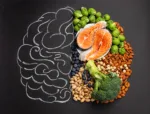How Nutrition Can Positively or Negatively Affect Your Mental Health

What recovery practices come to mind when you see or hear the phrase, “mental health”?
Maybe you think of traditional modalities like counseling and behavioral therapy, or maybe you visualize more personal habits to implement, like affirmations and positive self-talk.
For most people, food isn’t the first correlation their brain makes to mental health — even though nutrition is one of the largest influences in the state of a person’s overall health, mental health included.
Whether you’re actively recovering from a mental illness, a physical condition or an addiction, prioritizing your nutrition is one of the best habits you can establish for yourself, both in the short- and long-term.
The importance of nutrition
What we eat and drink is important, but we’re rarely given the education and tools around how exactly to properly and sustainably implement nutrition in our lives. That lack of awareness paired with the temptation of buying all the colorful, fun-looking foods in the grocery store, it’s no wonder there’s a health crisis among people of every age in America.
Nutrition matters. Everything we consume is going to be processed or absorbed by the body in some way, and those who chronically indulge in harmful foods are at risk for developing or exacerbating their mental health disorders.
Benefits of nutrition
Nutrition is like that best friend who always knows exactly what to say and what to do to make you feel better; the best friend you don’t know how you’d live without.
Some of the top benefits of nutrition include:
- Supporting overall health (organs, immune system, metabolism, etc.)
- Helping maintain a healthy weight (and helping lose excess fat)
- Boosting energy levels
- Improving mental health
- Strengthening immune system
- Promoting healthy and steady aging
Nutrition is essential in our everyday lives, and for those struggling with a mental illness, it’s important to maintain a proper balance within their daily diet. The foods we eat play a bigger role than just making sure we have enough calories to burn to make it through the day.
Mental health and nutrition
When it comes to how nutrition affects mental health, the research is definitive: what we eat directly impacts the health of our brain, as well as our emotional and mental health (the health of the mind — according to a study done by the Harvard Medical School.
While a fair amount of emphasis is typically placed upon the importance of our physical health (going outside, exercising, absorbing sunshine), the emphasis on nutrition is often much less. In the United States, it’s much more common to be prescribed a pill to help manage a mental or physical problem than actually be given the tools to heal it, or at least significantly relieve it.
Some believe this to be a result of an education system that doesn’t properly teach children proper nutrition and directly fuels poor eating habits through vending machines and cafeteria food.
Others believe that the mass deterioration of mental health in America is part of a larger political scheme, whether sourced in our own government or another country’s destabilization efforts.
There are many theories about why nutrition is so poorly represented in the majority of our healthcare system, but the importance of nutrition, diet and full-spectrum wellness is slowly being realized by many.
It can be overwhelming to know where to begin with taking charge of your health, but it’s not something you have to go through alone — we’re here to help.
Start your recovery today
Silvermist is a premier treatment provider that specializes in offering a variety of services for both addiction recovery and mental health care.
We recognize that no two people or conditions are alike, which is why we offer highly individualized treatment plans in order to fully meet each client’s needs and goals. Our mental health programs can help men and women of all ages overcome anxiety disorders, depression and mood disorders, as well as trauma-rooted behavioral or mental health issues.
Fill out this form to learn more about which of our programs is the best fit for you.






